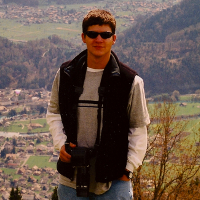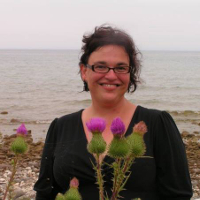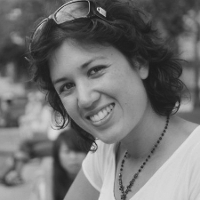Scott Lloyd DeWitt, Brian Harmon, Dundee Lackey, and Christina M. LaVecchia
Introduction | In Context | In Their Own Words | Archive | Credits
Credits
In Context
In 2014, we made some significant changes in the prompt for DMAC participants. First, we gave participants nearly double the amount of time to work on the assignment. This is a change that we unanimously agree was positive, and participants responded well. Second, we extended the duration of projects from 60 to 90 seconds. We are currently assessing whether we believe this decision resulted in stronger work. Finally, we revised the prompt’s language:
click here to download this prompt
In Their Own Words
Thank you, thank you, to everyone who participated in these conversations, and to the DMAC instructors who so graciously, patiently, and quickly remedied all possible shortcomings in equipment or knowledge. All faults that remain are therefore our own.
Archive: A Screening
I have experimented with locations for my class screenings (which happen during the final exam period). Among the most successful spots was at a local art house cinema called The Nickelodeon.
Selections from Ryan Trauman’s Photos of DMAC 2013
[slideshow_deploy id=’1020′]
2013 DMAC Interview Participants
Kara Poe Alexander, Department of English, Baylor University
Erin Kathleen (Cahill) Bahl, Department of English, The Ohio State University
Laura Michael Brown, Department of English, Penn State University
Paul Butler, Department of English, University of Houston
Kaitlin Clinnin, Department of English, The Ohio State University
Michelle Cohen, Department of English, The Ohio State University
Theresa Dark, Department of English, Eastern Michigan University
Crystal Gorham Doss, Department of English, University of Missouri-Kansas City
Torsa Ghosal, Department of English, The Ohio State University
Randy Gonzales, Department of English, University of Louisiana-Lafayette
Ginger Grey, Department of English, Gonzaga University
Allison Hammond, Department of English, University of Cincinnati
Katherine Heenan, Department of English, Arizona State University
Brian Harmon, Department of English, University of South Carolina
Van E. Hilliard, Rhetoric and Writing Studies, Davidson College
Jeff Kaufmann, Department of Anthropology & Sociology, University of Southern Mississippi
Jill Lamberton, Department of English, Wabash College
Christina LaVecchia, Department of English, University of Cincinnati
Annie McGreevy, Department of English, The Ohio State University
Maurine Ogbaa, Department of English, Prairie View A&M University
Renee Shea, formerly with Bowie State University
Eddie Singleton, Department of English, The Ohio State University
Danielle Williams, Department of English, Baylor University
Henrietta Rix Wood, Department of English, University of Missouri-Kansas City
We would also like to extend a hearty thank you to the 2013 DMAC instructors and staff for their unending generosity and support!
Works Cited
Ball, Cheryl E. “Show, not tell: The value of new media scholarship.” Computers & Composition 21.3 (2004): 403–425.
Digital Archive of Literacy Narratives. Columbus: Ohio State University Libraries.
Micciche, Laura R. “Writing as Feminist Rhetorical Theory.” Rhetorica in Motion: Feminist Rhetorical Methods & Methodologies. Ed. Eileen E. Schell and K.J. Rawson. Pittsburgh: University of Pittsburgh Press, 2010. 173-188. Print.
Trauman, Ryan. Unpublished Photographs. 2013.
Wysocki, Anne Frances. “awaywithwords : On the Possibilities in Unavailable Designs.” Computers & Composition 22.1 (2005): 55-62.
Authors
 Scott Lloyd DeWitt is an Associate Professor and Vice Chair of Rhetoric, Composition, and Literacy in the Department of English at The Ohio State University. His book Writing Inventions: Identites, Technologies, Pedagogies (SUNY 2002) won the 2003 Computers and Composition Distinguished Book Award, and he is currently examining a corpus of 5000+ pieces of student writing for a book called The Optimistic Turn: Authentic Contexts for Peer Review in Composition Instruction. With Cynthia Selfe he serves as Director of DMAC.
Scott Lloyd DeWitt is an Associate Professor and Vice Chair of Rhetoric, Composition, and Literacy in the Department of English at The Ohio State University. His book Writing Inventions: Identites, Technologies, Pedagogies (SUNY 2002) won the 2003 Computers and Composition Distinguished Book Award, and he is currently examining a corpus of 5000+ pieces of student writing for a book called The Optimistic Turn: Authentic Contexts for Peer Review in Composition Instruction. With Cynthia Selfe he serves as Director of DMAC.
 Brian Harmon is a PhD candidate in Rhetoric and Composition at The University of South Carolina. His work investigates how digital documentary methods might be deployed in classrooms as both an evaluative research method and as a pedagogical tool that might encourage and enable critical pedagogy and social advocacy. Before returning to academia, Brian worked professionally in New Zealand and China as a photographer, video producer, and creative manager for a range of commercial and social entities.
Brian Harmon is a PhD candidate in Rhetoric and Composition at The University of South Carolina. His work investigates how digital documentary methods might be deployed in classrooms as both an evaluative research method and as a pedagogical tool that might encourage and enable critical pedagogy and social advocacy. Before returning to academia, Brian worked professionally in New Zealand and China as a photographer, video producer, and creative manager for a range of commercial and social entities.

Dundee Lackey is an Assistant Professor in the Department of English, Speech, and Foreign Languages at Texas Woman’s University in Denton, TX and a graduate of Michigan State University’s Rhetoric and Writing program. Her special interest areas are digital/community literacies and she has a special love for first-year composition and multimodal pedagogy.
 Christina LaVecchia is a doctoral candidate in the Department of English at the University of Cincinnati, with research interests in writing pedagogy and theory, the rhetorics of media and culture, affect, feminist theory, and writing program administration. She is currently an editorial assistant for Composition Studies, and served as Assistant to the Directors of Composition at UC in 2010–11. Her Harlot essay on the rhetorics of Modern Family recently was reprinted in the textbook How Writing Works, edited by Jordynn Jack and Katie Rose Guest Pryal.
Christina LaVecchia is a doctoral candidate in the Department of English at the University of Cincinnati, with research interests in writing pedagogy and theory, the rhetorics of media and culture, affect, feminist theory, and writing program administration. She is currently an editorial assistant for Composition Studies, and served as Assistant to the Directors of Composition at UC in 2010–11. Her Harlot essay on the rhetorics of Modern Family recently was reprinted in the textbook How Writing Works, edited by Jordynn Jack and Katie Rose Guest Pryal.